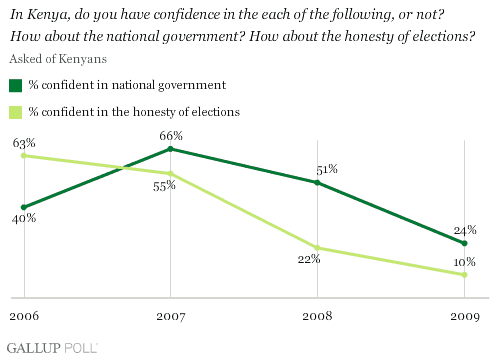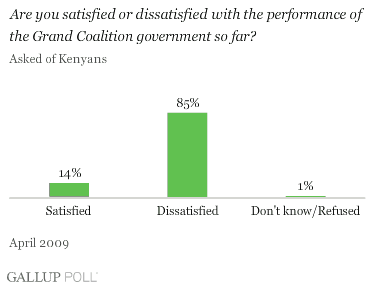WASHINGTON, D.C. -- U.S. Secretary of State Hillary Clinton's visit to Kenya Tuesday comes at an uncertain time for the Kenyan government. The violence that erupted following the disputed presidential election of December 2007 ceased in April 2008 with the formation of a Grand Coalition government that included the two main rivals, incumbent President Mwai Kibaki and challenger Raili Odinga. However, Kenyans' confidence in the national government and in the honesty of the country's elections continued to plummet, as indicated by Gallup's April 2009 poll.

Prior to the 2007 election, two-thirds of Kenyans (66%) were confident in the country's national government. In August 2008, four months after the Grand Coalition government was formed, that percentage was down to about half (51%). By April 2009, confidence levels had fallen even more sharply, to about one in four Kenyans (24%).
Some of this drop in confidence may be attributable to the global recession, which has driven down the price of Kenya's agricultural commodities and reduced trade levels. However, the post-election turmoil may have caused many Kenyans to lose faith in the country's political system. Confidence in the electoral process has also fallen sharply. In 2007, most Kenyans (55%) said they were confident in the honesty of their elections; in 2008, that number was down to 22%. By 2009, it had dropped to 10%.
Moreover, political conflict between Kibaki and Odinga -- for whom a new prime ministerial office was created as part of the April 2008 agreement -- has continued under the coalition government, hampering economic and political reforms and undermining progress toward a new constitution. In April 2009, 14% of Kenyans said they were satisfied the performance of the coalition government; 85% were dissatisfied.

For complete data sets or custom research from the more than 150 countries ÆéûÜǨû§continually surveys, please contact worldpollpartners@gallup.com or call 202.715.3030.
Survey Methods
Results are based on face-to-face interviews with approximately 1,000 adults, aged 15 and older, conducted in April 2006, June 2007, and April 2009 in Kenya, and 2,200 adults, aged 15 and older, in August 2008 in Kenya. For results based on the 2006, 2007, and 2009 samples, one can say with 95% confidence that the maximum margin of sampling error is ôÝ5 percentage points. For results based on the 2008 sample, one can say with 95% confidence that the maximum margin of sampling error is ôÝ3 percentage points. The margin of error reflects the influence of data weighting. In addition to sampling error, question wording and practical difficulties in conducting surveys can introduce error or bias into the findings of public opinion polls.
